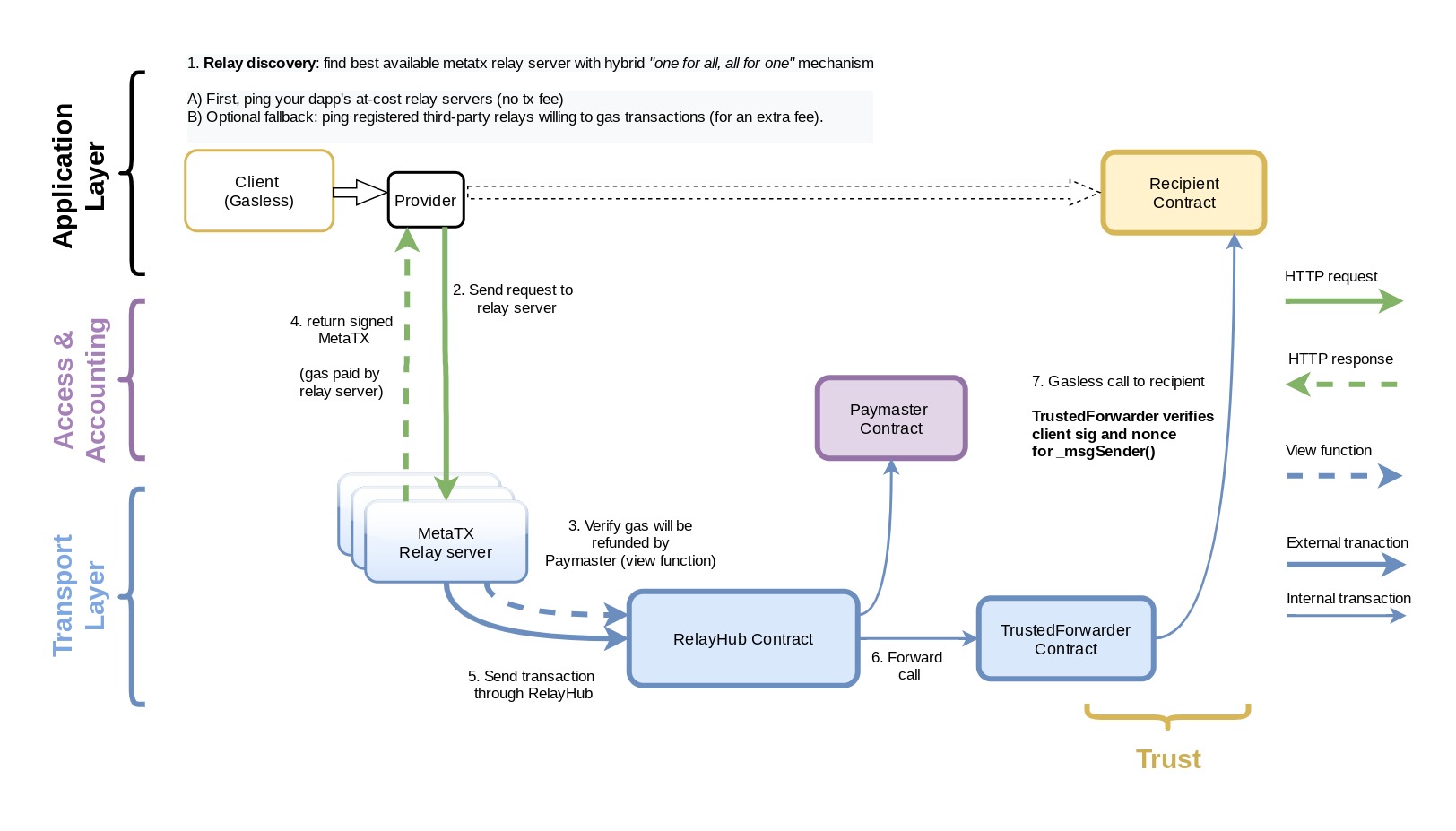# Ethereum Gas Station Network (GSN)

Ethereum Gas Station Network (GSN) abstracts away gas to minimize onboarding & UX friction for dapps. With GSN, gasless clients can interact with Ethereum contracts without users needing ETH for transaction fees. The GSN is a decentralized system that improves dapp usability without sacrificing security.
Example use cases for GSN:
- Pay gas in any token: Allow users to pay for gas in any token
- Pay gas in fiat: Allow users to pay for gas in fiat without having to go through KYC
- Privacy: Enabling ETH-less withdrawal of tokens sent to stealth addresses
- Onboarding: Allow dapps to subsidize the onboarding process for new users
# The problem
Without GSN, anyone who sends an Ethereum transaction needs to have ETH to pay for gas fees. This forces new users to pass KYC and purchase ETH before they can start using any dapp. This can be a major hurdle for users without prior crypto experience that are unfamiliar with the concept of needing to keep ETH in their wallet for gas.
This is also a UX pain for existing users that need to continually replenish their ETH balance to pay for gas fees even if they have tokens worth thousands of dollars in their wallet.
# Architecture

Components:
- Client: signs & sends meta transaction to relay server
- Relay servers: one for all and all for one
- Paymaster: agrees to refund relay server for gas fees
- Trusted Forwarder: verifies sender signature and nonce
- Recipient contract: sees original sender
- RelayHub: connecting participants trustlessly
# Client: signs & sends meta transaction to relay server
A meta-transaction is a fancy name for a simple idea: a relay server can send a user's transaction and pay themselves for the gas cost. Instead of signing an Ethereum transaction, which would require ETH for gas, a user signs a message containing information about a transaction they would like to execute and sends it to a relay server. Before the relay server pays for gas it verifies it will get refunded by a Paymaster contract.
# Relay servers: one for all, all for one
The best practice is for every dapp to deploy their own relay servers that will provide service at-cost to its own users and charge a transaction fee for serving the users of other dapps.
If the dapp's relay servers are unavailable (e.g., DoS attack) the client will fallback to routing transactions through the relay servers of other dapps that are willing to serve it in exchange for an extra fee.
This creates a "one for all and all for one" effect where taking down the frontend of any dapp is as hard as taking down the entire network. The more dapps participate the more robust the availability guarantee.
# Paymaster: agrees to refund relay server for gas fees
In the GSN, all access control and gas refund logic is implemented inside Paymaster contracts. A paymaster has a gas tank of ETH in the RelayHub and can implement any business logic to decide whether to accept or reject a meta transaction. For example, accepting only transactions by whitelisted users, or to the contracts methods required for onboarding users that also passed a captcha, or only transactions that include a repayment in tokens to the Paymaster, etc.
- To learn more about the Paymaster, see Paying for your user's meta-transaction
# Trusted Forwarder: verifies sender signature and nonce
Meta transaction aware recipient contracts only rely on a small trusted forwarder contract for their security. This contract verifies the signature and nonce of the original sender.
- To learn more about the trusted forwarder, see Trusted Forwarder: Minimum Viable Trust
# Recipient contract: sees original sender
To support meta transactions recipient contracts inherit from a simple
base
class (opens new window) and replace msg.sender with _msgSender(). It returns the the original
sender that signed the meta transaction request, or msg.sender if the contract
was called directly.
# RelayHub: connecting participants trustlessly
RelayHub connects users running clients, relay servers and paymasters so that participants don't need to know about or trust each other.
Dapp developers don't need to understand or trust the inner workings of RelayHub in order to integrate with the GSN. Recipient contracts are not exposed to potential security issues in RelayHub.
Under the hood the RelayHub helps clients discover the best third-party relay server when the dapp's relay servers are down, prevents third-party relay servers from censoring transactions, rebalances the ETH of relay servers serving their own Paymasters, and ensures Paymasters pay back relay servers for gas fees plus transaction fees.
# Next Steps
To learn more about the GSN, head over to the following resources:
- To learn how to integrate GSN with your contracts, see Writing GSN-capable contracts.
- To learn how to integrate GSN with your client, see Javascript client.